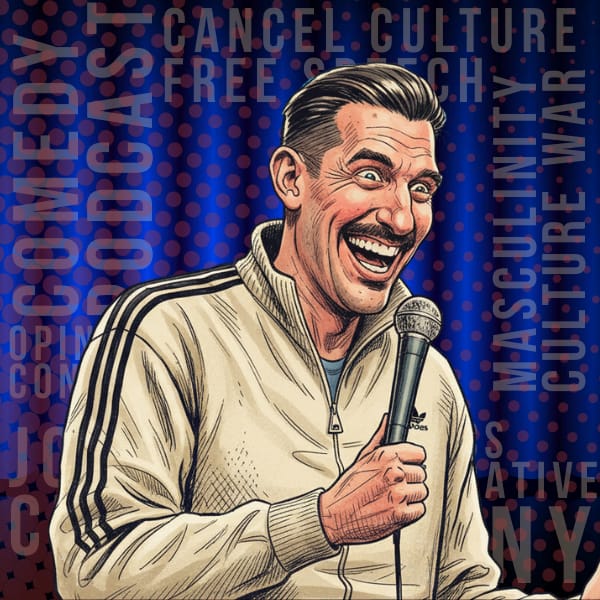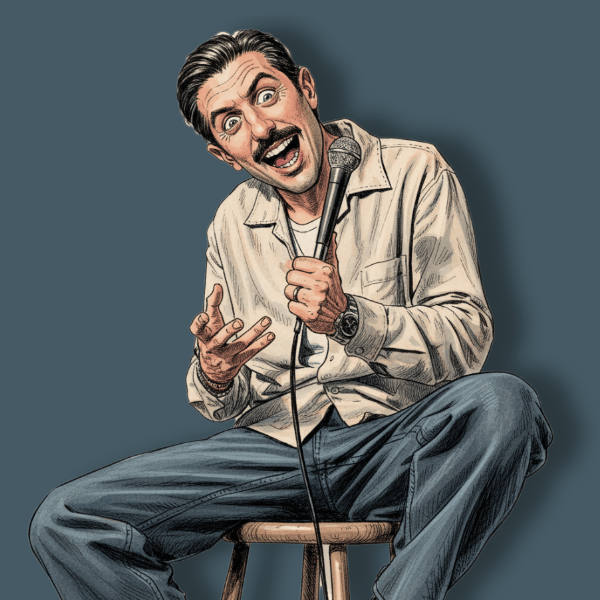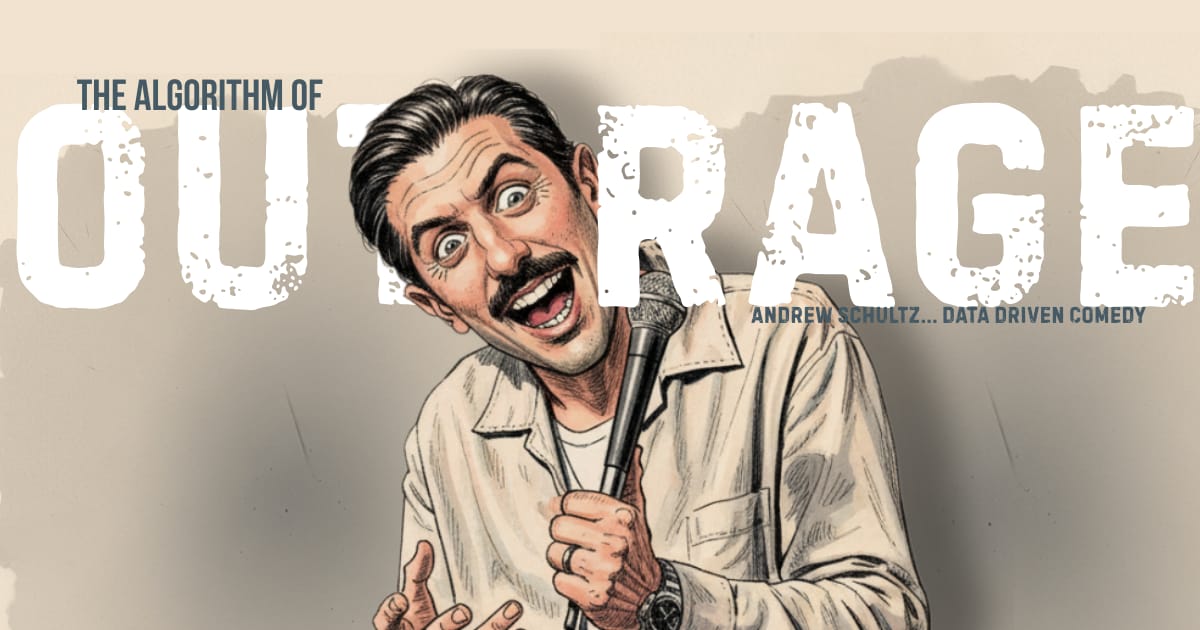Andrew Schulz talks about comedy the way a venture capitalist talks about startups—with constant references to testing, metrics, and market feedback. But where most comedians speak in mystical terms about "finding your voice," Schulz discusses his craft with the systematic precision of someone who's reverse-engineered the mechanics of laughter.
"I treat comedy like a science," Schulz has said, and this isn't mere metaphor. His approach reveals a performer who's built his career on measurable feedback loops, real-time audience data, and an almost algorithmic understanding of what makes people laugh—and more importantly, what makes them share.
That's when you know you've got something real… When people laugh at something they don't think they should laugh at.
The Laboratory of Live Performance
Schulz's comedy philosophy centers on what he calls "live testing"—a systematic approach to developing material that treats every audience as a focus group. Unlike comedians who labor over jokes in isolation, Schulz describes his process as fundamentally collaborative, though the collaboration happens in real-time with hundreds of strangers.

"I don't write jokes at home," he's explained. "I go on stage with ideas and let the audience tell me what's funny." This isn't the casual workshop approach many comedians employ; it's a disciplined methodology. Schulz tracks audience responses with the attention of a social media manager monitoring engagement metrics.
What makes this particularly sophisticated is how Schulz reads beyond simple laughter. He's described watching for "the uncomfortable laugh"—that moment when an audience member laughs despite themselves, signaling he's touched something genuine rather than just familiar. "That's when you know you've got something real," he's said. "When people laugh at something they don't think they should laugh at."
This approach reveals a performer who understands that comedy isn't just about getting laughs—it's about calibrating the precise type of laugh for maximum impact. Schulz has built his brand on pushing boundaries, and his live-testing methodology allows him to find exactly where those boundaries are for each specific audience.
The Controversy Calculus
Perhaps no contemporary comedian thinks as strategically about controversy as Schulz does. Where others stumble into hot water accidentally, Schulz has developed what amounts to a systematic approach to provocative material. He's spoken about "controversy as currency"—understanding that in the attention economy, being talked about matters more than being universally liked.
"I'd rather have 70% of people love me and 30% hate me than have 100% of people think I'm okay," Schulz has said. This isn't the reckless abandon of a shock comic; it's calculated brand positioning. He's identified that passionate engagement—even negative engagement—creates more sustainable career momentum than broad, lukewarm approval.
Schulz describes his approach to sensitive topics as "finding the truth in the controversy." Rather than simply being provocative for its own sake, he claims to look for genuine insights that happen to challenge prevailing sensibilities. "If you're just trying to offend people, that's lazy," he's explained. "But if you're trying to say something true that happens to offend people, that's different."
This distinction reveals sophisticated thinking about the relationship between comedy and social commentary. Schulz has positioned himself as someone willing to articulate thoughts that others might have but are afraid to express—a role that requires both courage and considerable social intelligence.
The Economics of Independence
Schulz's business philosophy is as systematic as his creative approach. He's been vocal about "owning your content" and has built his career around maintaining control over his material and distribution. This isn't just artistic integrity—it's strategic business thinking.

"The gatekeepers are gone," Schulz has said about the comedy industry. "You can build your own audience now." His approach to platforms like YouTube and podcasting reveals someone who understands that audience development is as important as joke development. He's described his content strategy in terms that sound more like digital marketing than traditional entertainment.
Schulz talks about "feeding the algorithm"—creating consistent content that platforms will promote. But he's sophisticated about this relationship, understanding that algorithmic success requires authentic engagement, not just frequent posting. "The algorithm rewards genuine reactions," he's observed. "You can't fake that."
This systematic approach to audience building has allowed Schulz to maintain creative independence while building a substantial following. He's created a model that other comedians study—turning live performance, podcast content, and social media into a integrated system for reaching audiences directly.
The Speed of Relevance
One of Schulz's most distinctive characteristics is his emphasis on comedic timing—not just within jokes, but in relation to cultural moments. He's described his approach as "comedy journalism," getting comedic takes on current events out while they're still fresh in the public consciousness.
"By the time most comedians have a bit about something, everyone's moved on," Schulz has said. His methodology prioritizes speed and relevance over perfect polish. This approach requires a different skill set than traditional comedy development—the ability to find the comedic angle in breaking news and get it in front of audiences within hours or days.
This emphasis on speed reveals someone who understands that comedy increasingly competes with all forms of digital content for attention. Schulz has adapted his creative process to match the pace of social media rather than the traditional timeline of comedy club development.
The Authenticity Algorithm
Despite his systematic approach, Schulz consistently emphasizes authenticity as the foundation of effective comedy. But his conception of authenticity is more nuanced than simple "be yourself" advice. He talks about "authentic perspective"—finding the genuine angle that only you can provide on shared experiences.
"Everyone's been through similar things," Schulz has observed. "The difference is how you see it." This suggests a comedian who understands that originality comes not from unique experiences but from unique processing of common experiences.
Schulz describes developing material as "finding your voice in the conversation." Rather than avoiding topics that other comedians have covered, he focuses on finding his distinctive angle. This approach requires considerable self-awareness and confidence in one's own perspective.
Practical Applications for Developing Comedians
Schulz's systematic approach offers several transferable techniques for comedians looking to develop their own processes:
Test material live before considering it finished, treating audiences as collaborative partners in development
Track different types of audience responses, not just volume of laughter
Develop material around current events with emphasis on speed and relevance
Build direct audience relationships through multiple platforms rather than relying solely on traditional industry gatekeepers
Calculate the risk/reward ratio of controversial material rather than avoiding or embracing it blindly
The Meta-Game of Modern Comedy
What emerges from Schulz's various statements about his craft is a performer who's deeply conscious of comedy's place in the broader media landscape. He's not just telling jokes; he's participating in cultural conversations, building brand identity, and creating content ecosystems.
"Comedy isn't just about being funny anymore," Schulz has said. "It's about being relevant, being authentic, being smart about business." This suggests someone who sees comedy as one component of a larger entertainment strategy rather than an end in itself.
This meta-awareness extends to how Schulz talks about his own success. He's described his approach as "reverse-engineering virality"—studying what makes content spread and then creating material designed to capitalize on those patterns. It's a level of strategic thinking that would have been foreign to earlier generations of comedians but seems essential for success in the current landscape.
The Schulz System
What makes Andrew Schulz's approach distinctive isn't any single technique but the integration of systematic testing, strategic controversy, business acumen, and authentic perspective into a coherent methodology. He's created what amounts to a personal algorithm for comedy success—one that can be analyzed, understood, and adapted by other performers.
This systematic approach might seem to contradict the spontaneous nature of comedy, but Schulz's success suggests otherwise. By bringing scientific rigor to the creative process, he's found ways to increase the probability of success without sacrificing the authenticity that makes comedy work.
For comedians studying craft, Schulz offers a model of how systematic thinking can enhance rather than constrain creativity. His approach demonstrates that understanding the mechanics of comedy—from audience psychology to platform algorithms—can provide the foundation for more effective artistic expression.
The challenge for other comedians isn't simply copying Schulz's methods but understanding the principles behind them and adapting those principles to their own circumstances and sensibilities. His true contribution may be demonstrating that comedy can be approached with both scientific rigor and artistic integrity—that systematic thinking and authentic expression aren't opposing forces but complementary tools for connecting with audiences in an increasingly crowded attention economy.



